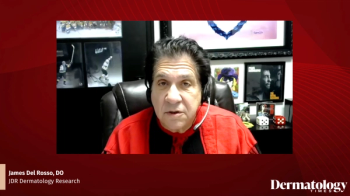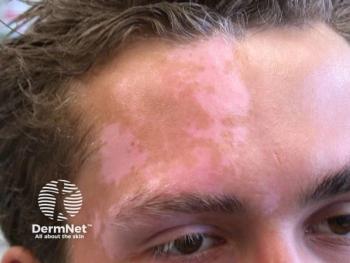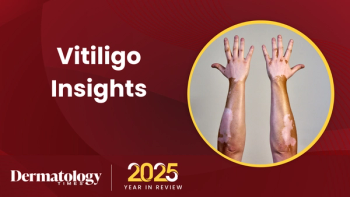
Study: Ruxolitinib Cream in Vitiligo
A study published in the Journal of the American Academy of Dermatology did a subgroup analysis of ruxolitinib cream for vitiligo patients.
A randomized phase 2 study (NCT03099304) of the Janus kinase (JAK) 1/ JAK 2 inhibitor ruxolitinib (Opzelura; Incyte and Novartis) cream was investigated as a treatment of facial and body vitiligo.1
The study included 157 patients and showed that patients on ruxolitinib achieved substantial regimentation after 24 weeks and continued improvement through week 52. Ruxolitinib was also well-tolerated.
The article did a sub-analysis of the trial. Of the 33 patients who received 1.5% ruxolitinib cream twice daily, greater than or equal to 50% of them achieved facial Vitiligo Area Scoring Index (F-VASI50) improvement at week 24, which was assessed by demographics and baseline clinical characteristics.
Also, a larger proportion of the patients who were less than or equal to 50 years old achieved F-VASI50 compared to those older than 50 years (58.8% vs 31.3%, respectively). More were female vs male (60.0% vs 33.3%). A larger proportion of responders had less than or equal to 1.5% affected baseline facial body surface area (BSA), a disease duration of more than 20 years, and previous treatment with phototherapy. There were no substantial differences between responders based on race, skin type, baseline total (T)-BSA, or disease status.
The proportion of patients initially randomized to 1.5% ruxolitinib cream once daily or twice daily that achieved greater than or equal to 50% and greater than or equal to 75% improvement from baseline in total VASI (T-VASI50 and T-VASI75, respectively) at week 52 was assessed by affected body area.
The ruxolitinib cream application was limited to less than or equal to 20% T-BSA—the limit for the practicality of application— and the total body analyses were conducted only in patients with vitiligo affecting less than or equal to 20% T-BSA at baseline.
T-VASI50 and T-VASI75 responses were seen among patients with vitiligo affecting 20% or less of their T-BSA by week 52 in both the once daily and twice daily 1.5% ruxolitinib cream applications. The twice daily application patients had the highest proportion of T-VASI50 responders in the head/neck area (60%), followed by the upper and lower extremities (52.9%, 52.6%, respectively), feet (29.45%) and the hands (15%), according to the article.
Ruxolitinib cream 1.5% demonstrated positive trends for treating vitiligo across demographics and clinical characteristics, including in patients with longstanding and extensive disease, the authors summarized.
There were F-VASI50 responses observed in more than 40% of patients that were previously treated with topical corticosteroids or topical calcineurin inhibitors and in 66% of patients who received prior phototherapy. Ruxolitinib cream also produced a clinically meaningful repigmentation of all body areas, including acral areas.
“Overall, these findings support the use of ruxolitinib cream for treating vitiligo,” the authors concluded. “Reported analyses were descriptive, and sample sizes were small, warranting confirmation of results in larger populations.”
Disclosures:
Hamzavi has served as an advisory board member for AbbVie; a consultant for Incyte Corporation, Pfizer, and UCB; a principal investigator for AbbVie, Allergan, Bayer, Clinuvel Pharmaceuticals, Estée Lauder, Ferndale Laboratories, Galderma Laboratories LP, GE Healthcare, Incyte Corporation, Janssen, Janssen Biotech, Johnson & Johnson, Lenicura, LEO Pharma, Pfizer, and Unigen; a subinvestigator for Amgen, Bristol Myers Squibb, Foamix Pharmaceuticals, and Janssen; president of the HS Foundation; and cochair of the Global Vitiligo Foundation. Dr Rosmarin has received honoraria as a consultant for AbbVie, Celgene, Dermavant Sciences, Dermira, Eli Lilly and Company, Janssen, Kyowa Kirin, Novartis, Pfizer, Regeneron Pharmaceuticals, Sanofi, Sun Pharmaceuticals, UCB, and VielaBio; research support from AbbVie , Amgen , Bristol Myers Squibb , Celgene , Dermira , Eli Lilly and Company , Incyte Corporation , Janssen , Merck , Novartis , Pfizer , and Regeneron Pharmaceuticals ; and has served as a paid speaker for AbbVie, Celgene, Eli Lilly and Company, Janssen, Novartis, Pfizer, Regeneron Pharmaceuticals, and Sanofi. Dr Harris has served as a consultant for AbbVie, Aclaris Therapeutics, BiologicsMD, EMD Serono, Genzyme/Sanofi, Janssen, Pfizer, Rheos Medicines, Sun Pharmaceuticals, TeVido BioDevices, The Expert Institute, 3rd Rock Ventures, and Villaris Therapeutics; has served as an investigator for Aclaris Therapeutics, Celgene, Dermira, EMD Serono, Genzyme/Sanofi, Incyte Corporation, LEO Pharma, Pfizer, Rheos Medicines, Stiefel/GSK, Sun Pharmaceuticals, TeVido BioDevices, and Villaris Therapeutics; holds equity in Rheos Medicines, TeVido BioDevices, and Villaris Therapeutics; is a scientific founder of Villaris Therapeutics; and has patents pending for IL-15 blockade for treating vitiligo, JAK inhibition with light therapy for vitiligo, and CXCR3 antibody depletion for the treatment of vitiligo. Dr Pandya has served as an investigator for Aclaris Therapeutics, Immune Tolerance Network, Incyte Corporation, and Pfizer; a consultant for Arcutis, Avita Medical, Chromaderm, Immune Tolerance Network, Incyte Corporation, Pfizer, Viela Bio, and Villaris; and a board member who also holds stock options for Clarify Medical and Tara Medical. Dr Lebwohl is an employee of Mount Sinai Hospital, which receives research funds from AbbVie , Amgen , Arcutis , Avotres , Boehringer Ingelheim , Dermavant , Eli Lilly and Company, Incyte Corporation , Janssen Research & Development , LLC, Ortho Dermatologics , Regeneron , and UCB , Inc; and is a consultant for Aditum Bio, Almirall, AnaptysBio, Arcutis, Aristea, Arrive Technology, Avotres Therapeutics, BioMX, Boehringer Ingelheim, Bristol Myers Squibb, Cara Therapeutics, Castle Biosciences, Corrona, Dermavant Sciences, Dr. Reddy's Laboratories, Evelo, Evommune, Facilitate International Dermatologic Education, Forte, Foundation for Research and Education in Dermatology, Helsinn, LEO Pharma, Meiji Seika Pharma, Mindera, Pfizer, and Verrica. Dr Gottlieb has received honoraria as an advisory board member and consultant for AnaptysBio, Avotres Therapeutics, Beiersdorf, Boehringer Ingelheim, Bristol Myers Squibb, Eli Lilly, Incyte Corporation, Janssen, LEO Pharma, Novartis, Sun Pharmaceuticals, and UCB; has stock options in Xbiotech; and has received institutional research/educational grants from Boehringer Ingelheim , Incyte Corporation , Janssen , Novartis , UCB , Xbiotech , and Sun Pharmaceuticals to Mount Sinai School of Medicine. Drs Butler, Kuo, and Sun are employees and shareholders of Incyte Corporation. Dr Grimes has served as a consultant for Aclaris Therapeutics, Clarify Medical, DermaForce, Incyte Corporation, Proctor & Gamble, and Versicolor Technologies and a principal investigator for Aclaris Therapeutics, Allergan/SkinMedica, Clinuvel Pharmaceuticals, Incyte Corporation, Johnson & Johnson, L'Oreal, Merz Pharma, Pfizer, Thync Global Inc, and VT Cosmetics.
The study was funded by Incyte Corporation (Wilmington, DE). Writing assistance was provided by Laurie Orloski, PharmD, of ICON (North Wales, PA) and was funded by Incyte Corporation.
Reference:
1. Hamzavi I, Rosmarin D, Harris JE, et al. Efficacy of ruxolitinib cream in vitiligo by patient characteristics and affected body areas: Descriptive subgroup analyses from a phase 2, randomized, double-blind trial. Journal of the American Academy of Dermatology. 2021;0(0). doi:10.1016/j.jaad.2021.05.047
Newsletter
Like what you’re reading? Subscribe to Dermatology Times for weekly updates on therapies, innovations, and real-world practice tips.











